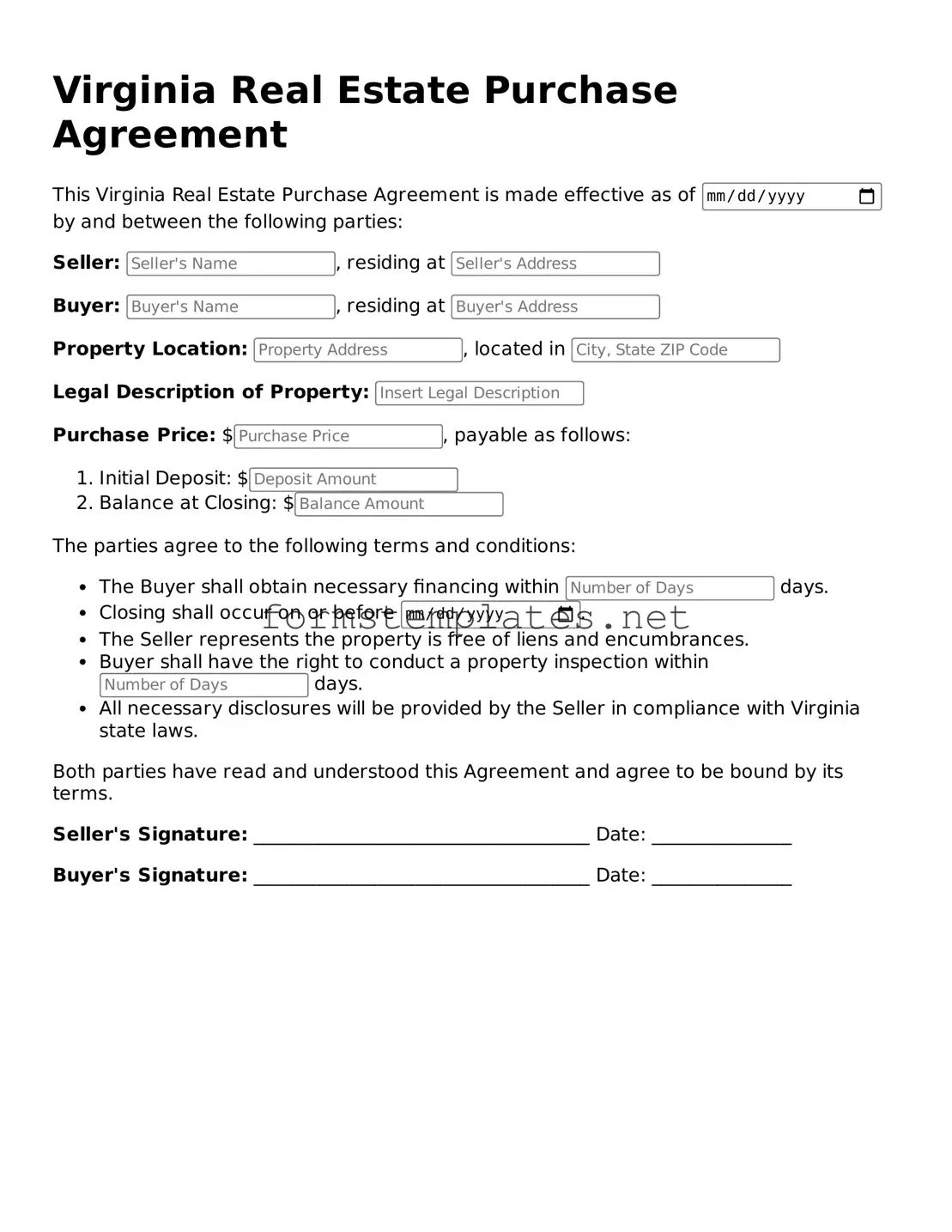What is a Virginia Real Estate Purchase Agreement?
The Virginia Real Estate Purchase Agreement is a legal document that outlines the terms and conditions of a real estate transaction between a buyer and a seller. This form serves to protect the interests of both parties by clearly stating the details of the sale, including the property description, purchase price, contingencies, and timelines for closing.
Who typically uses this agreement?
This agreement is primarily used by individuals or entities involved in the buying or selling of residential real estate in Virginia. Real estate agents, brokers, and attorneys may also use this document to facilitate transactions on behalf of their clients.
What key elements are included in the agreement?
Several important components are typically included in the Virginia Real Estate Purchase Agreement, such as:
-
Property Description:
A detailed description of the property being sold, including its address and any relevant legal identifiers.
-
Purchase Price:
The agreed-upon price for the property.
-
Contingencies:
Conditions that must be met for the sale to proceed, such as financing approval or home inspections.
-
Closing Date:
The date when the transaction will be finalized and ownership will be transferred.
-
Earnest Money:
A deposit made by the buyer to demonstrate their commitment to the purchase.
What contingencies can be included in the agreement?
Contingencies are essential as they protect both parties. Common contingencies include:
-
Financing contingency, allowing the buyer to back out if they cannot secure a mortgage.
-
Inspection contingency, giving the buyer the right to have the property inspected and request repairs.
-
Appraisal contingency, ensuring the property appraises at or above the purchase price.
How does the earnest money deposit work?
The earnest money deposit is a sum of money that the buyer provides to demonstrate their serious intent to purchase the property. Typically, this deposit is held in escrow until the closing date. If the transaction goes through, the earnest money is usually applied toward the buyer's closing costs. If the buyer backs out without a valid reason outlined in the contingencies, they may forfeit this deposit.
Can the agreement be modified after it is signed?
Yes, the Virginia Real Estate Purchase Agreement can be modified after it is signed, but both parties must agree to any changes. Modifications should be documented in writing and signed by both the buyer and seller to ensure clarity and avoid misunderstandings.
What happens if the buyer or seller breaches the agreement?
If either party fails to fulfill their obligations under the agreement, it may be considered a breach. The non-breaching party typically has several options, which may include:
-
Seeking specific performance, which requires the breaching party to complete the transaction.
-
Requesting damages, which may cover any financial losses incurred due to the breach.
-
Terminating the agreement, if allowed under the terms of the contract.
Is it advisable to have a lawyer review the agreement?
Yes, having a lawyer review the Virginia Real Estate Purchase Agreement is often a wise decision. A legal professional can ensure that the document is comprehensive and that your rights and interests are adequately protected. This is especially important if you are unfamiliar with real estate transactions or if complex issues arise.
How can I obtain a Virginia Real Estate Purchase Agreement?
The Virginia Real Estate Purchase Agreement can be obtained through various sources, including real estate agents, online legal form providers, or local real estate offices. It is important to ensure that the version you are using is up to date and compliant with current Virginia laws.

